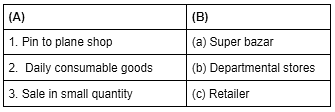Test: Internal Trade- Case Based Type Questions - Commerce MCQ
18 Questions MCQ Test Business Studies (BST) Class 11 - Test: Internal Trade- Case Based Type Questions
Direction: Match the following types of goods from column I with the itinerant retailers selling them from column II.
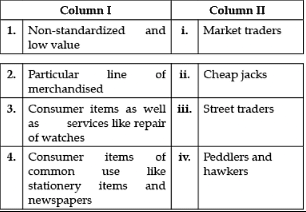

Direction: Match the following features given in Column I with the types of itinerant retailers given in Column II.
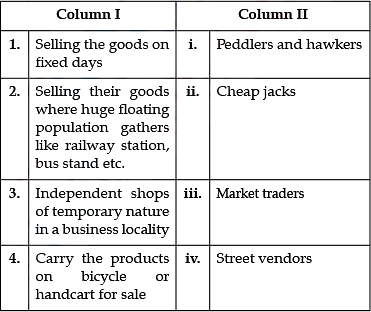

| 1 Crore+ students have signed up on EduRev. Have you? Download the App |
Direction: Match the fixed shop small retailers given in column II with the types of goods sold by them from column I.
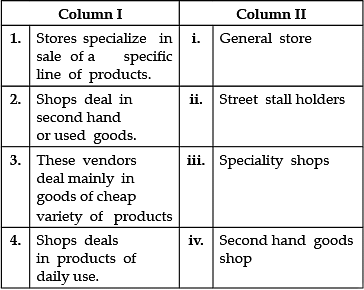

Direction: Match the statements given in column I with services of wholesalers to retailers given in Column II.
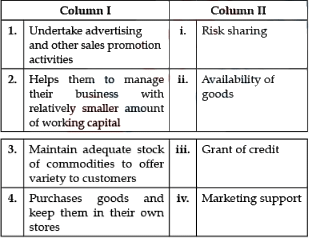
Direction: Read the following text and answer the questions that follow:
Malti was selling vegetables going door to door in the local area in her cart along with her mother. Her father sells consumer items of daily use outside different temples of that locality at different places on fixed days. She doesn’t like the business of selling vegetables because of short shelf life of vegetables and very little profit. She told her father to take loan and to open a small shop where all plastic items of daily use like jugs, baskets, thread-box, containers, etc. can be sold. Due to lack of funds, her father could not take a shop on rent rather he decided to sell soft-drinks, mouth freshener, beetle leaf etc. on a temporary platform with limited space at one of the crossing.
Q. Identify the type of trade discussed above:
Direction: Read the following text and answer the questions that follow:
Malti was selling vegetables going door to door in the local area in her cart along with her mother. Her father sells consumer items of daily use outside different temples of that locality at different places on fixed days. She doesn’t like the business of selling vegetables because of short shelf life of vegetables and very little profit. She told her father to take loan and to open a small shop where all plastic items of daily use like jugs, baskets, thread-box, containers, etc. can be sold. Due to lack of funds, her father could not take a shop on rent rather he decided to sell soft-drinks, mouth freshener, beetle leaf etc. on a temporary platform with limited space at one of the crossing.
Q. “...soft-drinks, mouth freshener, beetle leaf, etc. on a temporary platform with limited space at one of the crossing’. The type of retailer stated here is:
Direction: Read the following text and answer the questions that follow:
Malti was selling vegetables going door to door in the local area in her cart along with her mother. Her father sells consumer items of daily use outside different temples of that locality at different places on fixed days. She doesn’t like the business of selling vegetables because of short shelf life of vegetables and very little profit. She told her father to take loan and to open a small shop where all plastic items of daily use like jugs, baskets, thread-box, containers, etc. can be sold. Due to lack of funds, her father could not take a shop on rent rather he decided to sell soft-drinks, mouth freshener, beetle leaf etc. on a temporary platform with limited space at one of the crossing.
Q. “She told her father to take loan and to construct a small shop where all plastic items of daily use like jugs, baskets, thread-box, containers can be sold.” Specify the type of retailer indicated here:
Direction: Read the following text and answer the questions that follow:
Malti was selling vegetables going door to door in the local area in her cart along with her mother. Her father sells consumer items of daily use outside different temples of that locality at different places on fixed days. She doesn’t like the business of selling vegetables because of short shelf life of vegetables and very little profit. She told her father to take loan and to open a small shop where all plastic items of daily use like jugs, baskets, thread-box, containers, etc. can be sold. Due to lack of funds, her father could not take a shop on rent rather he decided to sell soft-drinks, mouth freshener, beetle leaf etc. on a temporary platform with limited space at one of the crossing.
Q. “Malti was selling vegetables going door to door.” What kind of retailer Malti is?
Direction: Read the following text and answer the questions that follow:
Malti often noticed that nuclear families where both husband and wife go to work find it difficult to cook as cleaning and cutting vegetables took a lot of time, so as an entrepreneur she started gathering information regularly and developed a new product line of selling chopped vegetables in hygienic packaging under the brand name ‘Sabjiwala’. She started her shop in her home space. In the beginning, she catered to the orders of customers directly but later on as demand increased, it was difficult for her to manage all the orders from that space. Her friends advised her to sell the products by opening her chain stores. This will increase her sales turnover and eventually the profits. Following her friend’s suggestion now she has expanded her business to an extent that from a small shop operating from her home, she has changed it to a chain store having its 6 branches in the city.
Q. ‘In the beginning, she catered to the orders of customers directly’. Who serves as the last link in the distribution channel?
Direction: Read the following text and answer the questions that follow:
Malti often noticed that nuclear families where both husband and wife go to work find it difficult to cook as cleaning and cutting vegetables took a lot of time, so as an entrepreneur she started gathering information regularly and developed a new product line of selling chopped vegetables in hygienic packaging under the brand name ‘Sabjiwala’. She started her shop in her home space. In the beginning, she catered to the orders of customers directly but later on as demand increased, it was difficult for her to manage all the orders from that space. Her friends advised her to sell the products by opening her chain stores. This will increase her sales turnover and eventually the profits. Following her friend’s suggestion now she has expanded her business to an extent that from a small shop operating from her home, she has changed it to a chain store having its 6 branches in the city.
Q. Identify which of the following is not an advantage of a chain store?
Direction: Read the following text and answer the questions that follow:
Malti often noticed that nuclear families where both husband and wife go to work find it difficult to cook as cleaning and cutting vegetables took a lot of time, so as an entrepreneur she started gathering information regularly and developed a new product line of selling chopped vegetables in hygienic packaging under the brand name ‘Sabjiwala’. She started her shop in her home space. In the beginning, she catered to the orders of customers directly but later on as demand increased, it was difficult for her to manage all the orders from that space. Her friends advised her to sell the products by opening her chain stores. This will increase her sales turnover and eventually the profits. Following her friend’s suggestion now she has expanded her business to an extent that from a small shop operating from her home, she has changed it to a chain store having its 6 branches in the city.
Q. ’Chains Stores are the examples of which type of retailers?
Direction: Read the following text and answer the questions that follow:
Malti often noticed that nuclear families where both husband and wife go to work find it difficult to cook as cleaning and cutting vegetables took a lot of time, so as an entrepreneur she started gathering information regularly and developed a new product line of selling chopped vegetables in hygienic packaging under the brand name ‘Sabjiwala’. She started her shop in her home space. In the beginning, she catered to the orders of customers directly but later on as demand increased, it was difficult for her to manage all the orders from that space. Her friends advised her to sell the products by opening her chain stores. This will increase her sales turnover and eventually the profits. Following her friend’s suggestion now she has expanded her business to an extent that from a small shop operating from her home, she has changed it to a chain store having its 6 branches in the city.
Q. Identify which of the following is not the service of retailers to consumers?
Direction: Read the below case and answer the questions that follow:
Laxya is an NRI who came to India to visit her grandparents living in the small town of Jaipur. One day, during the absence of her grandfather when her grandmother fell sick, Lakshya decided to go to the market to get the required items. Her grandmother told her, “there is no fixed shop retail store selling all the goods under one roof in this town. You have to buy the items from the traders who do not have fixed place to operate.” She instructed Laxya to:
(a) Buy the vegetables from the cart-pushers who come to their doorstep to supply fruits and vegetables.
(b) Buy nail cutter and peacock feathers for pooja ghar from Som Bazaar which is held on every second Monday of the month, outside Shiva temple.
(c) She will get magazine near bus stand from the retailers who sit on pavements.
(d) For small wooden handicrafts, she can find a temporary shop in next lane which was hired by a person a month before only.
Q. ’there is no fixed shop retail store selling all the goods under one roof in this town’. Identify the type of retailer mentioned here:
Direction: Read the below case and answer the questions that follow:
Laxya is an NRI who came to India to visit her grandparents living in the small town of Jaipur. One day, during the absence of her grandfather when her grandmother fell sick, Lakshya decided to go to the market to get the required items. Her grandmother told her, “there is no fixed shop retail store selling all the goods under one roof in this town. You have to buy the items from the traders who do not have fixed place to operate.” She instructed Laxya to:
(a) Buy the vegetables from the cart-pushers who come to their doorstep to supply fruits and vegetables.
(b) Buy nail cutter and peacock feathers for pooja ghar from Som Bazaar which is held on every second Monday of the month, outside Shiva temple.
(c) She will get magazine near bus stand from the retailers who sit on pavements.
(d) For small wooden handicrafts, she can find a temporary shop in next lane which was hired by a person a month before only.
Q. “buy nail cutter and peacock feathers for pooja ghar from Som Bazaar which is held on every second Monday of the month, outside Shiva temple.” Identify the types of retailers as stated in the given sentence:
Direction: Read the below case and answer the questions that follow:
Laxya is an NRI who came to India to visit her grandparents living in the small town of Jaipur. One day, during the absence of her grandfather when her grandmother fell sick, Lakshya decided to go to the market to get the required items. Her grandmother told her, “there is no fixed shop retail store selling all the goods under one roof in this town. You have to buy the items from the traders who do not have fixed place to operate.” She instructed Laxya to:
(a) Buy the vegetables from the cart-pushers who come to their doorstep to supply fruits and vegetables.
(b) Buy nail cutter and peacock feathers for pooja ghar from Som Bazaar which is held on every second Monday of the month, outside Shiva temple.
(c) She will get magazine near bus stand from the retailers who sit on pavements.
(d) For small wooden handicrafts, she can find a temporary shop in next lane which was hired by a person a month before only.
Q. “For small wooden handicrafts, she can find a temporary shop in next lane which was hired by a person a month before only”. Identify the types of retailers as stated in the given sentence:
Direction: Read the below case and answer the questions that follow:
Laxya is an NRI who came to India to visit her grandparents living in the small town of Jaipur. One day, during the absence of her grandfather when her grandmother fell sick, Lakshya decided to go to the market to get the required items. Her grandmother told her, “there is no fixed shop retail store selling all the goods under one roof in this town. You have to buy the items from the traders who do not have fixed place to operate.” She instructed Laxya to:
(a) Buy the vegetables from the cart-pushers who come to their doorstep to supply fruits and vegetables.
(b) Buy nail cutter and peacock feathers for pooja ghar from Som Bazaar which is held on every second Monday of the month, outside Shiva temple.
(c) She will get magazine near bus stand from the retailers who sit on pavements.
(d) For small wooden handicrafts, she can find a temporary shop in next lane which was hired by a person a month before only.
Q. “You have to buy the items from the traders who do not have fixed place to operate.” Name such retailers.
|
37 videos|146 docs|44 tests
|
|
37 videos|146 docs|44 tests
|


